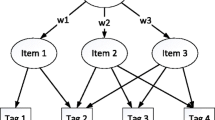Abstract
Synonymy tags are very common in social tagging system, which also influence the performance of recommendation algorithm based on tags. In order to obtain a better performance, this paper uses WordNet to determine the meaning of target tags, and consturcts synonymy tag set for collecting synonymy tags under a defined classification, which is a result of application Clique Percolation Method on user saved resources. Then, the set is applied to resource model for extension, and weight coefficient method is adopted while the synonymy tags are absorbed in. On basis of this, the recommendation algorithm is put forward, and dataset from hetrec is taken for experiment. A new evaluation method named quality value of recommended resource is created in the paper, and the results show that the performance of optimization algorithm is better than the baseline one, but with the increasing number of users and resources, the percentage of improvement is become narrowed.




Similar content being viewed by others
References
Tommasel, A., Godoy, D.: Semantic grounding of social annotations for enhancing resource classification in folksonomies. J. Intell. Inf. Syst. 44(3), 415–446 (2015)
Damiano, R., Gena, C., Lombardo, V.: Leveraging social semantic components in executable environments for learning. Expert Syst. 32(2), 277–292 (2015)
Pitsilis, G., Wang, W.: Harnessing the power of social bookmarking for improving tag-based recommendations. Comput. Hum. Behav. 50, 239–251 (2015)
Yi, K.: A semantic similarity approach to predicting library of congress subject headings for social tags. J. Am. Soc. Inf. Sci. Technol. 61(8), 1658–1672 (2010)
Kamran S., Jazayeri M., Ettefagh T. CODer entrepreneurs: how entrepreneurs can benefit from a dynamic social semantic tagging system. In: Proceedings of the 19th ACM Conference on Computer Supported Cooperative Work and Social Computing Companion, pp. 305–308 (2016)
Wu X., Zhang L. Yu Y.: Exploring social annotations for the semantic web. In: Proceedings of the 15th International Conference on World Wide Web. ACM, New York, USA, pp. 417–426 (2006)
Li R., Bao S.H., Fei B., Su Z., Yu Y.: Towards effective browsing of large scale social annotations. In: Proceedings of the 16th International Conference on World Wide Web. ACM, New York, USA, pp. 943–952 (2007)
Alruqimi, M., Aknin, N.: Semantic emergence from social tagging systems. Int. J. Organ. Collect. Intell. 5(1), 16–31 (2015)
Rui Y., Lu H., Yang K., Mei T., Fu J.: Tagging personal photos with transfer deep learning. In: Proceedings of the 24th International Conference on World Wide Web, Florence, Italy, pp. 344–354 (2015)
Xu Z., Lukasiewicz T., Chen C., Miao Y., Meng X.: Tag-aware personalized recommendation using a hybrid deep model. In: Proceedings of the Twenty-Sixth International Joint Conference on Artificial Intelligence, pp. 3196–3202 (2017)
Zuo, Y., Zeng, J., Gong, M., Jiao, L.: Tag-aware recommender systems based on deep neural networks. Neurocomputing 204, 51–60 (2016)
Guan Z., Wang C., Bu J., Chen C., Yang K., Cai D., He X.: Document recommendation in social tagging services. In: Proceedings of the 19th international conference on World Wide Web. Raleigh, North Carolina, USA, pp. 391–400 (2010)
Li, H., Hu, X., Lin, Y., He, W., Pan, J.: A social tag clustering method based on common co-occurrence group similarity. Frontt. Inf. Technol. Electron. Eng. 17(2), 122–134 (2016)
Beldjoudi, S., Seridi, H., Zucker, C.F.: Personalizing and improving resource recommendation by analyzing users preferences in social tagging activities. Comput. Inf. 36, 223–256 (2017)
Wagner C., Singer P., Strohmaier M., Huberman B.A.: Semantic stability in social tagging streams. In: Proceedings of the 23rd international conference on World Wide Web, Seoul, Korea, pp. 735–746 (2014)
Kim H.L., Hwang S.H., Kim H.G.: FCA-based approach for mining contextualized folksonomy. In: Proceedings of the 2007 ACM Symposium on Applied Computing. ACM, New York, USA, pp. 1340–1345 (2007)
Specia, L., Motta, E.: Integrating Folksonomies with the Semantic Web. LNCS: The Semantic Web: Research and Applications, vol. 4519, pp. 624–639. Springer, Heidelberg (2007)
Lee K., Kim H., Jang C., Kim H.: FolksoViz: a subsumption-based folksonomy visualization using wikipedia texts. In: Proceeding of the 17th International Conference on World Wide Web. ACM. New York, USA, pp. 1093–1094 (2008)
Sriharee, G.: An ontology-based approach to auto-tagging articles. Vietnam J. Comput. Sci. 2(2), 85–94 (2015)
Wan, C., Kao, B., Cheung, D.W.: Location-sensitive resources recommendation in social tagging systems. In: Proceedings of the 21st ACM International Conference on Information and Knowledge Management, Maui, USA, pp. 1960–1964 (2012)
Lu, D., Liu, X., Qian, X.: Tag based image search by social re-ranking. IEEE Trans. Multimed. 18(8), 1628–1639 (2016)
Nam, H., Joshi, Y.V., Kannan, P.K.: Harvesting brand information from social tags. J. Mark. 81(4), 88–108 (2017)
Kowald, D., Lex, E.: The influence of frequency, recency and semantic context on the reuse of tags in social tagging systems. In: Proceedings of the 27th ACM Conference on Hypertext and Social Media, ACM, New York, USA, pp. 237–242 (2016)
Symeonidis, P., Nanopoulos, A., Manolopoulos, Y.: A unified framework for providing recommendations in social tagging systems based on ternary semantic analysis. IEEE Trans. Knowl. Data Eng. 22(2), 179–192 (2010)
Kim, H.N., Roczniak, A., Lévy, P., Saddik, E.A.: Social media filtering based on collaborative tagging in semantic space. Multimed. Tools Appl. 56, 63–89 (2012)
Wei, J.L., Ju, C.H.: Research on user collaboration model based on social tagging. J. China Soc. Sci. Tech. Inf. 31(3), 281–288 (2012)
Voorhees, E.M.: Query expansion using lexical-semantic relations. In: Proceedings of the 17th Annual International ACM SIGIR Conference on Research and Development in Information Retrieval. Springer-Verlag, New York, USA, pp. 61–69 (1994)
Acknowledgements
The research was supported by the Humanities and Social Science Foundation of Chinese Ministry of Education (No.17YJA870020), Zhejiang provincial soft science research project(No.2015C25016, 2017C25008)
Author information
Authors and Affiliations
Corresponding author
Rights and permissions
About this article
Cite this article
Wei, J., Meng, F. Personalized information recommendation based on synonymy tag optimization. Cluster Comput 22 (Suppl 3), 5467–5478 (2019). https://doi.org/10.1007/s10586-017-1306-5
Received:
Revised:
Accepted:
Published:
Issue Date:
DOI: https://doi.org/10.1007/s10586-017-1306-5




